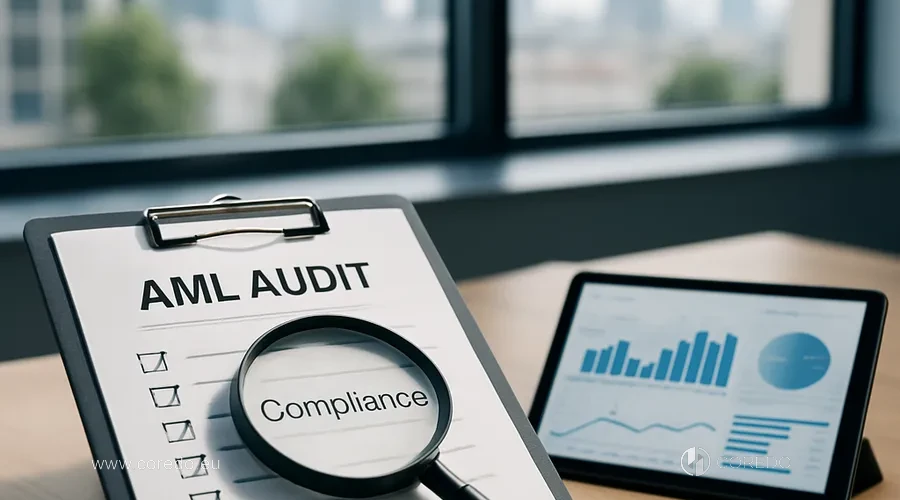What is the real risk for businesses? Why can even formally missing deadlines threaten not only six-figure fines, but also account freezes, license revocations and the loss of partners?
Здесь: не только аналитика, но и практические шаги, чек-листы и стратегические идеи, которые команда COREDO успешно реализует для клиентов в самых сложных юрисдикциях. Прочитайте статью до конца, чтобы не допустить критических ошибок и выстроить устойчивую систему AML compliance.
What is an AML audit for businesses in the Czech Republic

In the context of tightening regulatory requirements, it is precisely the AML audit that helps companies not only comply with the law but also minimize the risks of financial sanctions and reputational damage.
Definition of an AML audit and its role in compliance requirements
Internal audit allows identifying gaps in procedures, assessing the effectiveness of current measures, while an external audit provides independent expertise and preparation for regulatory inspections. COREDO’s practice confirms: regular auditing reduces the risk of fines, account blocking and loss of licenses, and also increases the trust of banks and partners.
New AML requirements in 2025
From 2025, the FAU (Financial Analytical Office of the Czech Republic) tightened the requirements: the list of obliged entities has been expanded, mandatory registration of an AML contact person was introduced, procedures for identifying beneficial owners have been strengthened, and all processes must be documented and automated. The solution developed by COREDO for international clients includes integrating the new requirements into business processes and preparing for the deadline of 1 February 2025.
Penalties for AML violations in the Czech Republic
Violations are recorded in public registers, which leads to reputational losses and the severing of relationships with banks and investors. In COREDO’s practice there have been cases when late registration of an AML contact person led to the blocking of all outgoing payments until the violation was remedied.
AML audit in the Czech Republic, stages of implementation

Conducting an AML audit in the Czech Republic is not a one-time formality but a comprehensive process required for any business subject to anti-money laundering requirements. A step-by-step guide to the stages of an AML audit will help to understand the details of mandatory procedures, prepare the business for regulator inspections and build a compliance system that is resilient to risks and compliant with Czech legislation.
Preparation and planning of the AML audit
The first step is defining the scope of the audit and collecting all documentation: AML policies, KYC files, audit protocols, transaction registers. COREDO’s experience shows: thorough preliminary diagnostics make it possible to identify hidden risks and optimally allocate resources. At this stage the team is formed, key risk areas and audit priorities are determined.
Risk assessment and jurisdiction analysis
The COREDO team uses modern transaction analysis and client profiling tools, which makes it possible to detect anomalies and suspicious patterns at an early stage.
Review of client KYC procedures
The implementation of digital onboarding and remote verification, carried out by COREDO for fintech companies, speeds up the process and reduces the number of errors.
Analysis of transaction monitoring and suspicious operations
Modern transaction monitoring systems with AI support allow detecting suspicious operations in real time. It is important to assess the accuracy of anomaly detection, the level of false positives and the effectiveness of automated filters. In one of COREDO’s cases, the integration of AI modules reduced the number of false positives by 45% without loss of monitoring quality.
Review of sanctions screenings and PEP monitoring
Screenings must be integrated into the onboarding process and updated at least once a month. COREDO’s solution for the banking sector includes automatic matching with global lists and maintaining a history of checks.
Stage 6: Assessment of internal policies and documents
Internal AML policies must not only be formally approved but also regularly updated to reflect legislative changes. Special attention is paid to audit protocols, maintaining monitoring logs and the correctness of transaction registers. COREDO’s practice shows: a clear structure and allocation of responsibilities significantly increase the resilience of the compliance system.
Review of the suspicious transaction reporting system
It is important to ensure the completeness and quality of information, document all stages of preparation and analyze the history of submitted reports. In one of COREDO’s projects, automation of STR preparation reduced response time to 2 hours.
Assessment of AML competencies and personnel
Since 2025 the AML contact person must have confirmed qualifications and experience in the field of compliance. Assessing staff knowledge, regular training and testing are mandatory elements of an effective AML program. COREDO implements comprehensive training modules and retraining programs for clients from various industries.
Testing and verification of system effectiveness
Staff testing, analysis of previous incidents, internal audit and evaluation of training effectiveness make it possible to identify systemic problems and address them in a timely manner. The solution developed by COREDO provides for regular stress tests and an audit of the effectiveness of compliance processes.
Stage 10: Preparation of the Report and Recommendations
COREDO’s practice confirms: a clear follow-up audit plan increases the likelihood of successfully passing regulatory inspections.
AML compliance in the Czech Republic: requirements

Key requirements for AML compliance in the Czech Republic: these are not formal rules but a comprehensive system of measures that affects governance structure, internal processes and state supervision. New obligations came into force in 2025, including the appointment and registration of an AML contact person, without which companies risk facing serious sanctions and loss of trust from partners and regulators.
Appointment and registration of the AML contact person
Requirements include relevant education, experience in AML/compliance and timely updating of data via datová schránka. The contact person bears personal responsibility for interacting with regulators and the timely submission of STRs.
| Requirement | Description | Deadline |
|---|---|---|
| Appointment of the contact person | For all obligated companies | By February 1, 2025 |
| Registration with the FAU | Submission of documents via datová schránka | By February 1, 2025 |
| Education | Finance/law | Upon appointment |
| Work experience | In AML/compliance | Upon appointment |
| Updating data | Upon changes | Within 5 days |
Requirements for internal AML policies
It is important to document all processes, allocate responsibilities and regularly update policies in accordance with new requirements.
Requirements for identification of beneficial owners
The tightening of requirements in 2025 requires the precise identification and disclosure of information about beneficial owners, regular verification of data and updating information when ownership structures change. All information must be entered into the register of beneficial owners and be available for inspection by regulators.
Requirements for KYC and Due Diligence procedures
All due diligence results are documented, and eKYC is integrated into onboarding processes to speed up and improve the accuracy of verification.
Transaction monitoring: detection of suspicious transactions
Criteria for identifying suspicious transactions must be formalized, and STRs must be submitted to the FAU within the established deadlines with a full package of information.
AML compliance solutions for the Czech Republic

Technological solutions for AML compliance in the Czech Republic are becoming increasingly sought after against the backdrop of tightening legislation and the rapid development of digital financial services. The integration of automated tools enables companies not only to meet regulatory requirements but also to significantly improve the efficiency of data processing and risk management. Below we will examine the key issues in choosing and implementing such solutions in practice.
Automation of AML processes: selection and implementation
For medium-sized companies, cloud-based transaction monitoring systems with the ability to integrate with CRM and ERP are optimal. Implementing such solutions, as COREDO’s experience has shown, makes it possible to reduce costs by 30–40% and increase the speed of transaction processing.
How AI detects suspicious transactions
AI and machine learning make it possible to detect complex anomalies, reduce false positives and analyze large volumes of data. The use of ML models in COREDO projects has shown an increase in the accuracy of detecting suspicious transactions to 98% and a reduction in the time to process STRs.
eKYC and digital onboarding: 2025 requirements
From 2025, eKYC and digital onboarding are becoming the standard for all companies subject to AML. The eIDAS regulation requirements include the use of biometric identification, remote verification and integration with government databases. COREDO’s solutions allow faster client onboarding and ensure full compliance with the new requirements.
Checklist for Preparing for an AML Audit in the Czech Republic
| No. | Task | Documents/Materials | Deadlines | Responsible |
|---|---|---|---|---|
| 1 | Conduct an audit of current procedures | Audit report, identified gaps | By 31 January 2025 | Manager, Compliance Officer |
| 2 | Update internal AML policies | Policies, procedural documents | By 31 January 2025 | Compliance Officer |
| 3 | Appoint an AML contact person | Appointment order, CV, proof of experience | By 1 February 2025 | Manager |
| 4 | Register the contact person with the FAU | Application via datová schránka | By 1 February 2025 | AML contact person |
| 5 | Implement automated systems | Platform, configurations, integration | By 28 February 2025 | IT, Compliance Officer |
| 6 | Conduct staff training | Materials, records, tests | Monthly | HR, Compliance Officer |
| 7 | Update KYC documentation | Client data, verification | By 31 March 2025 | Compliance Officer |
| 8 | Check sanctions lists | Screening, reports | Monthly | Compliance Officer |
| 9 | Document all procedures | Protocols, logs, registers | Ongoing | Compliance Officer |
| 10 | Conduct an internal audit | Audit report, recommendations | Quarterly | Internal Auditor |
Requirements for different categories of companies

Specific requirements for different categories of companies determine the level of business responsibility and formal procedures under the law. For each sector of activity, not only the list of mandatory measures changes, but also the depth of control: this is particularly noticeable in the example of AML requirements for real estate agencies in the Czech Republic, where compliance rules and standards are updated annually.
AML requirements for real estate agents in the Czech Republic
Internal control and documentation of all operations are mandatory.
AML requirements for accounting and auditing firms
Accounting and auditing firms must implement internal AML control, train staff, record all suspicious operations and interact with the FAU upon their detection. In COREDO’s practice, automation of reporting has reduced the administrative burden by 25%.
AML requirements for financial and payment companies
Financial institutions supervised by ČNB are required to comply with enhanced requirements for licensing, capital, reserves and monitoring procedures. COREDO’s solutions include comprehensive preparation for licensing and support for interaction with ČNB and FAU.
Risk Management and Reputation
risk management and reputational security are the foundation for the resilience and development of modern business. An effective strategy in this area not only enables timely identification and mitigation of threats, but also strengthens the trust of clients, partners and investors. Below we will consider the key aspects of AML risk assessment and other important elements of a reputational security framework.
AML Risk Assessment in Business
The risk-based approach methodology involves regular risk assessments of customers, transactions, jurisdictions and products. The use of automated tools (for example, risk scoring platforms) allows COREDO to quickly identify and document critical risk areas.
Protection against Reputational Risks and Breaches
Violations of AML requirements lead to long-term consequences: loss of banks’ trust, contract terminations, and reduced investment attractiveness. Implementing whistleblowing procedures and fostering a culture of compliance are key elements of long-term business resilience.
Optimization of AML system costs
Optimizing operational costs when implementing AML systems has become a key factor in the long-term sustainability and efficiency of financial organizations. Today process automation of compliance allows significantly reducing the time, resources and costs related to combating money laundering, while reducing operational risks and increasing the transparency of business processes.
In this context, it is important to consider how to properly evaluate the ROI on investments in AML audit and automation, and which areas of optimization deserve attention.
Return on investment for AML audit and automation
According to COREDO’s experience, implementing automated AML systems pays off within 12–18 months through reduced operational costs, minimized fines and improved process efficiency. Performance metrics include TCO, onboarding speed and the percentage of detected suspicious transactions.
Outsourcing or an in-house compliance department
Outsourcing compliance functions is appropriate for small and medium-sized companies that need to rapidly scale AML operations. An in-house compliance department is necessary for large organizations with high transactional activity. Hybrid models implemented by COREDO enable optimal resource allocation and cost reduction.
Key Findings and Recommendations
For entrepreneurs:
- Appoint and register an AML contact person by 1 February 2025
- Conduct a full audit of procedures and address gaps
- Invest in monitoring automation
- Build a compliance culture through regular training
For executives and Compliance Officers:
- Develop an AML compliance development strategy with KPIs
- Use a risk-based approach to prioritize resources
- Integrate AML processes with CRM
- Conduct internal audits quarterly
For marketers and consultants:
- Emphasize experience working with the new requirements
- Create educational content
- Develop partnership programs with AML providers
- Showcase successful implementation cases
Universal 3-month checklist:
- January 2025: audit, appointment of contact person, policy updates
- February 2025: registration of the contact person with the FAU, implementation of automation
- March 2025: staff training, KYC updates, internal audit
Additional resources and contacts
- Financial Analytical Office (FAU): AML regulator in the Czech Republic
- Czech National Bank (ČNB): supervision of financial companies
- European Commission – source of information on AMLD, 6AMLD
- COREDO consultants – expertise in legal and financial support for compliance projects
COREDO’s experience proves: a systematic approach, modern technologies, and professional support are the key to long-term success in the European market.